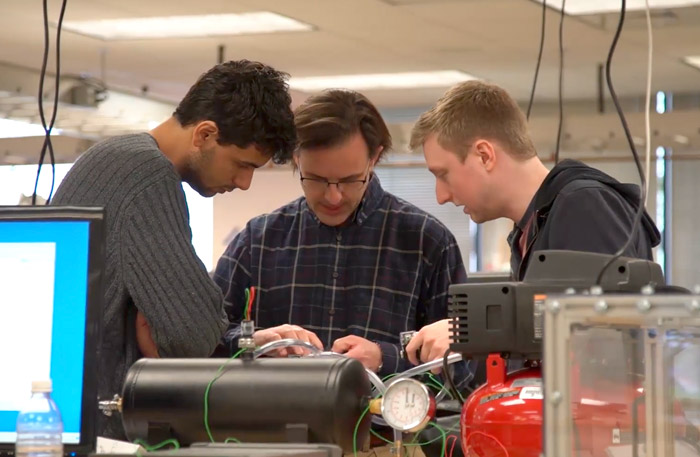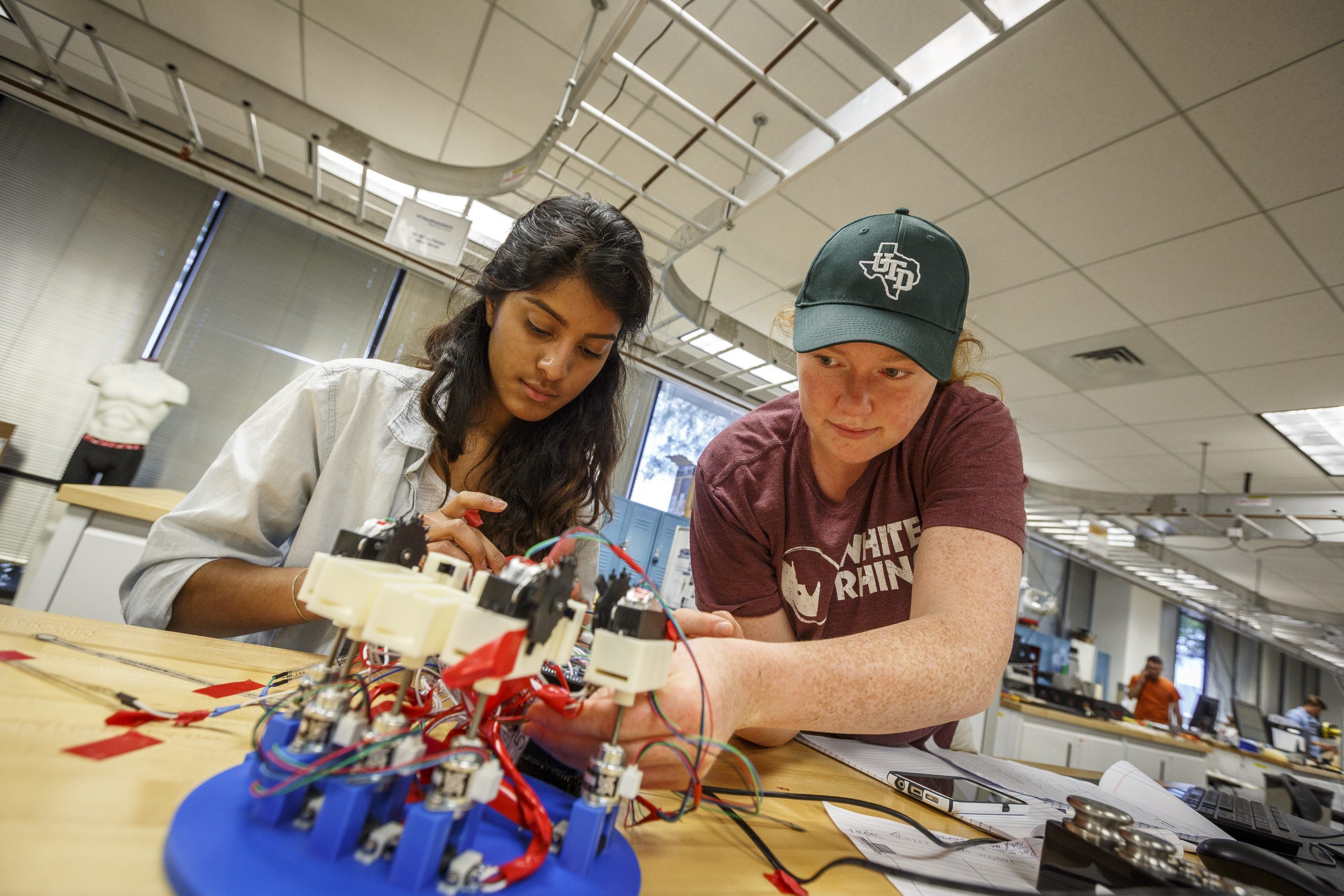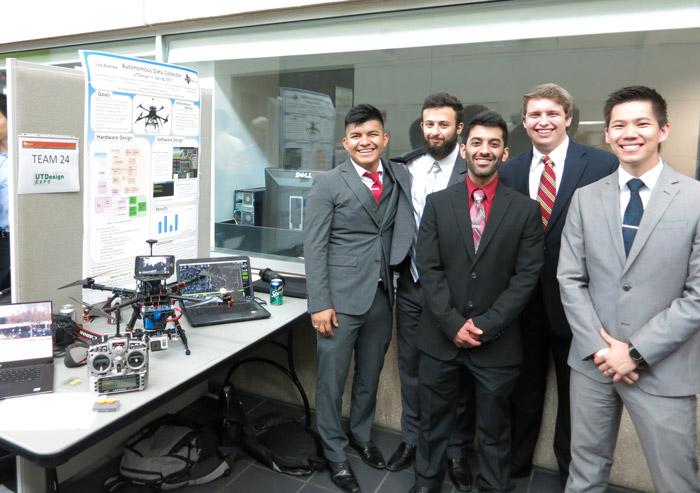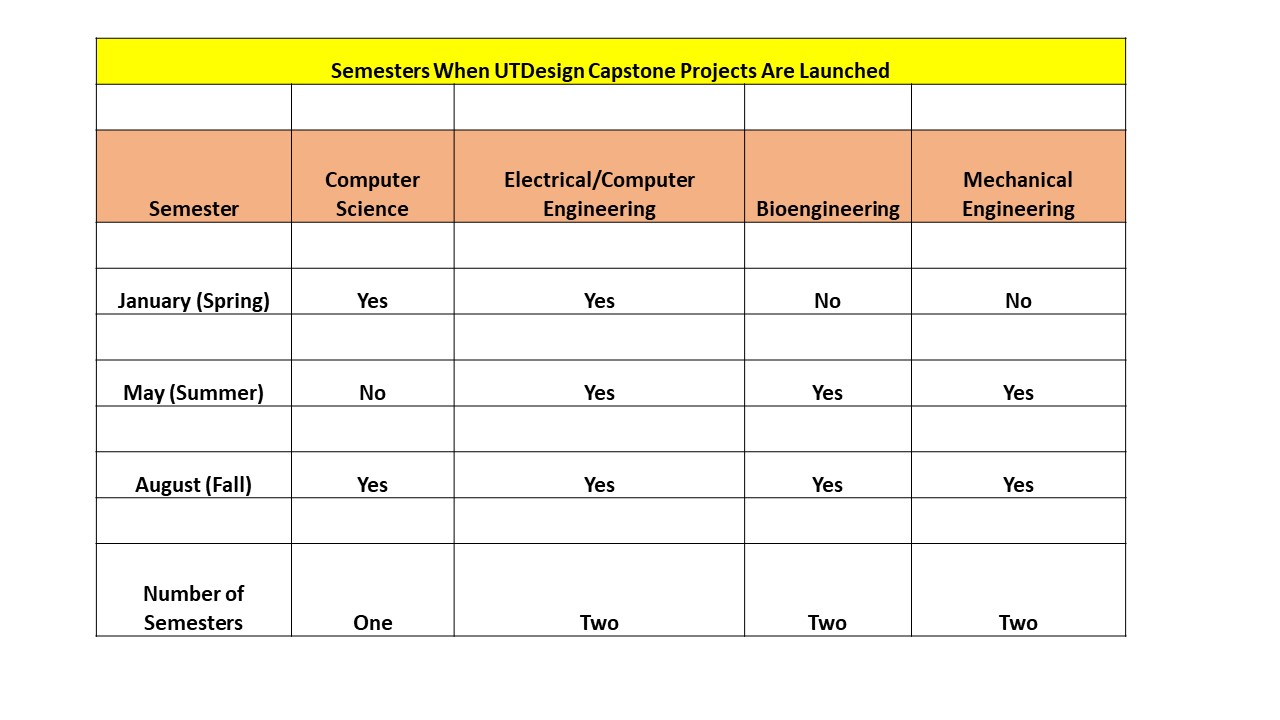UTdesign empowers students as they work alongside industry leaders to solve real-world engineering problems
OVERVIEW OF THE PROGRAM
Learn More About Safe Use Of Face Coverings In UTD Labs
Download The Latest Student Project Hazard Assessment
Every engineering and computer science senior at UT Dallas is required to complete a team-oriented capstone project (senior design course). This final project allows students to fully engage in the design process and put in practice their project-management and problem-solving skills. The course gives students hands-on design experience and prepares them for the work world.
UTDesign projects are proposed, sponsored and mentored by companies. Students not only get to work on a real world problem, but also get to work in an environment similar to that of industry professionals.
Each UTDesign team typically consists of 4-6 senior students working an average of 10 hours a week for 2 semesters (15 hours per week in the summer). (Computer Science offers a one-semester project). The team has the advantage to be coached by two people: a corporate mentor, who acts as the technical point of contact for the company, and a UT Dallas advisor.
During the length of the project the team will:
- Determine the customer’s needs and find all the necessary specifications and requirements for the project.
- Research the project and work on preliminary designs.
- Write a proposal for the company and deliver a preliminary design presentation and report.
- Work on a final design, prototype, testing and validation.
- Prepare all project documentation for the company.
- Prepare a final oral presentation and poster presentation for the UTDesign Expo.

Benefits
Get exposure to real engineering problems
Gain industry experience
Get guidance from two experts in the area – a corporate mentor and a faculty advisor
Have opportunities for internships or employment recruitment by company sponsors
Learn new technology used in the workplace
Learn more from working in a team environment
The UTDesign App
Students can now access UTDesign resources through the one-stop shop UTDesign app, available on both iOS and Android app stores. These resources will help them complete their UTDesign Capstone or EPICS projects more effectively.
Available resources include information and guidance on 3D printing, usage of the fabrication shop and open lab, ordering parts and materials, printing documents, helpful forms and templates, and much more. UTDesign Capstone and EPICS students also receive news and reminder alerts regarding appointment schedules, resource management and general announcements related to UTDesign.
The app can also be used by faculty, staff, and students alike to communicate effectively through one-click contacting.
A built-in feedback system within the app provides a path for continuous improvement for its features and usage.
Expectations

When students agree to work for a UTDesign project, they should:
- Plan to devote ample time to the project. These are real and challenging problems. To solve them, teams can expect to spend a total of 800 hours per semester.
- Have a flexible schedule. The team will frequently meet with corporate mentors and faculty advisors outside class hours. Plan your schedule accordingly.
- Communicate regularly with your mentors. Weekly meetings are recommended.
- Have a planned agenda for your meetings. Publish meeting minutes after your meetings.
- Be on time, and don’t miss meetings or deadlines. Remember, this is like a 15-30 week interview, and it may land you a job.
- Work as a team.
- Act professionally at all times. Students are representatives of UT Dallas when they interact with their corporate mentors.
Deliverables
During the semester, the team will have a set of deliverables that is specific to the project and the department. The list commonly includes:
- Technical reports
- Drawings and design specifications
- Prototypes, computer programs, simulation models
- Final report and presentation
- Test and evaluations results

IP & NDA
UTDesign Capstone projects may result in ideas, inventions, creations, developments or improvements that are important to corporate sponsors. Partners typically secure rights to UTDesign intellectual property by having student participants sign intellectual property (IP) and non-disclosure agreements (NDA).
INTELLECTUAL PROPERTY AGREEMENT
Corporate partners are encouraged to enter into mutually acceptable agreements with the UTDesign students and their teams. This allows them to secure rights to the IP developed during the course of the project. These agreements are to be made between the company and the students.
NON-DISCLOSURE AGREEMENT
All students engaged in corporate projects must be aware of and committed to an NDA. Usually, the NDA is incorporated into the IP agreement.
Budget
Computer science projects have up to $500 per semester to purchase materials, licenses, and devices. Engineering and interdepartmental projects have up to $3,000 for parts, materials, and fabrication expenses. This allowance can be used only for materials and supplies needed for the project. Some projects may require equipment that exceeds the assigned budget. In this case, the team should work with the UTDesign department director and corporate mentor to determine the best way to proceed.
Capital items, including computing devices, cannot be purchased and given to corporate partners during or at the end of the project.
Every purchase needs approval from the team’s faculty advisor. If the purchase amount exceeds $500, the team also needs the UTDesign department director’s approval.
Previous corporate mentors recommend the following as best practices:
- Weekly meetings are required
- Weekly reports are very beneficial
- Give feedback on reports
- Designate one person to be the point of contact, usually the team leader
- Hold the team accountable for its schedule
- Propose a project doable in 30 weeks (15 for Computer Science)
- Make sure the team understands the objective
The Corporate Mentor Guidelines for Computer Science Projects and Engineering Projects detail these roles and outline a typical semester schedule.
FAQ
When do the Capstone projects begin?

What is UTDesign Capstone?
UTDesign Capstone is a program that provides our senior engineering and computer science students with a meaningful experience on their Capstone project by partnering with industry to create solutions to real-world engineering and computer science problems. Sponsored UTDesign Capstone projects are proposed and mentored by companies. Students not only get to work on a real company project, but also gain valuable experience working in an environment similar to that of their industry mentor(s).


